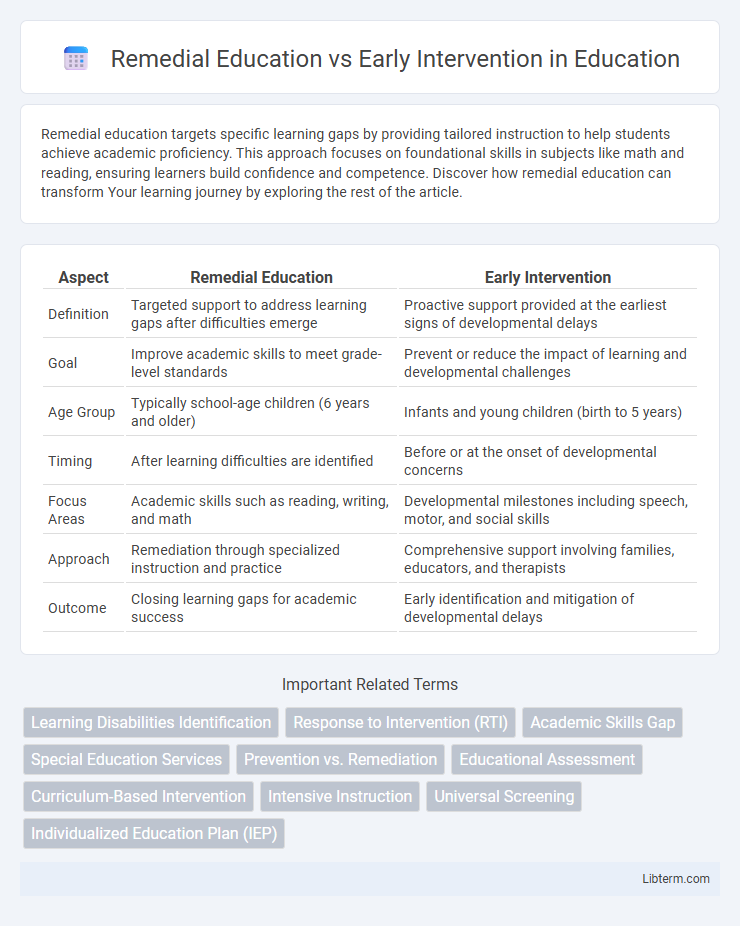Remedial education targets specific learning gaps by providing tailored instruction to help students achieve academic proficiency. This approach focuses on foundational skills in subjects like math and reading, ensuring learners build confidence and competence. Discover how remedial education can transform Your learning journey by exploring the rest of the article.
Table of Comparison
| Aspect | Remedial Education | Early Intervention |
|---|---|---|
| Definition | Targeted support to address learning gaps after difficulties emerge | Proactive support provided at the earliest signs of developmental delays |
| Goal | Improve academic skills to meet grade-level standards | Prevent or reduce the impact of learning and developmental challenges |
| Age Group | Typically school-age children (6 years and older) | Infants and young children (birth to 5 years) |
| Timing | After learning difficulties are identified | Before or at the onset of developmental concerns |
| Focus Areas | Academic skills such as reading, writing, and math | Developmental milestones including speech, motor, and social skills |
| Approach | Remediation through specialized instruction and practice | Comprehensive support involving families, educators, and therapists |
| Outcome | Closing learning gaps for academic success | Early identification and mitigation of developmental delays |
Definition of Remedial Education
Remedial education is specialized instruction designed to help students who have fallen behind in core academic skills such as reading, writing, or math, aiming to bring them up to grade-level proficiency. It targets gaps in foundational knowledge and skills through tailored teaching approaches, often offered after regular school hours or alongside standard curriculum. This form of education contrasts with early intervention, which focuses on identifying and addressing developmental delays before formal schooling begins.
Defining Early Intervention
Early intervention refers to specialized support and services provided to young children, typically from birth to age five, who exhibit developmental delays or are at risk of such challenges. This proactive approach aims to address learning, behavioral, or physical difficulties as early as possible to improve long-term outcomes. Unlike remedial education, which focuses on helping older students catch up academically, early intervention emphasizes prevention and developmental support during critical early years.
Key Differences Between Remedial Education and Early Intervention
Remedial education targets students who have already demonstrated learning difficulties, providing tailored instruction to address specific skill gaps and improve academic performance. Early intervention focuses on identifying and supporting children with developmental delays or educational risks before formal schooling begins, aiming to prevent future learning problems. The key difference lies in timing and purpose: remedial education is reactive, addressing existing challenges, while early intervention is proactive, promoting developmental progress to avoid learning deficits.
Goals and Objectives of Remedial Education
Remedial education aims to address specific learning deficits by reinforcing foundational skills and knowledge gaps, enabling students to achieve grade-level competencies. Its primary goals include improving literacy, numeracy, and subject-specific understanding through targeted instruction and practice. This approach focuses on remediation after learning difficulties have been identified, contrasting with early intervention's emphasis on preventing delays before they become entrenched.
Goals and Objectives of Early Intervention
Early intervention aims to identify and address developmental delays or disabilities in children as early as possible to maximize their potential for learning and growth. Its primary goals include enhancing cognitive, social, and motor skills through tailored support and minimizing the impact of developmental challenges before formal schooling begins. Unlike remedial education, which focuses on correcting academic weaknesses after they emerge, early intervention prioritizes prevention and early skill acquisition to promote long-term success.
Target Populations for Each Approach
Remedial education primarily targets students who have already fallen behind in academic skills, often those in elementary through high school facing challenges in reading, math, or writing proficiency. Early intervention focuses on at-risk infants and young children, including those with developmental delays or disabilities, aiming to address learning and developmental issues before they significantly impact academic achievement. Both approaches emphasize tailored support but differ in timing and the specific populations they serve to improve educational outcomes.
Timing and Implementation Strategies
Remedial education targets students after learning difficulties are identified, often using specialized instruction to address gaps in core skills, whereas early intervention focuses on identifying and supporting developmental delays or learning challenges at the earliest stages, typically in preschool or early elementary years. Effective implementation of remedial education requires diagnostic assessments and tailored teaching strategies to help students catch up, while early intervention relies on proactive screening and multisensory approaches to prevent future academic struggles. Timing is critical, with early intervention aiming to minimize the need for remedial services by addressing issues before they escalate.
Long-Term Outcomes and Effectiveness
Remedial education targets students after learning difficulties have surfaced, often resulting in slower progress and less effective skill recovery, whereas early intervention addresses developmental delays or learning challenges during critical developmental stages, significantly enhancing long-term academic and social outcomes. Studies show early intervention improves cognitive abilities and reduces the need for special education services later, while remedial education tends to focus on skill remediation without fully closing learning gaps. Investing in early intervention yields higher cost-effectiveness and sustained improvements in educational attainment compared to remedial programs.
Challenges and Limitations of Both Approaches
Remedial education often faces challenges such as delayed identification of learning gaps and limited resources, which can hinder timely support and long-term academic progress. Early intervention is constrained by difficulties in accurate early diagnosis and inconsistencies in program implementation across diverse populations. Both approaches struggle with scalability and ensuring individualized support, impacting overall effectiveness in addressing learning disabilities.
Integrating Remedial Education and Early Intervention for Student Success
Integrating remedial education and early intervention programs enhances student success by addressing learning gaps promptly and providing targeted support tailored to individual needs. Early intervention identifies emerging challenges in literacy and numeracy, while remedial education reinforces foundational skills, creating a seamless continuum that prevents academic failure. Collaborative strategies involving educators, specialists, and families ensure consistent progress monitoring and adaptive instruction, maximizing educational outcomes.
Remedial Education Infographic

 libterm.com
libterm.com